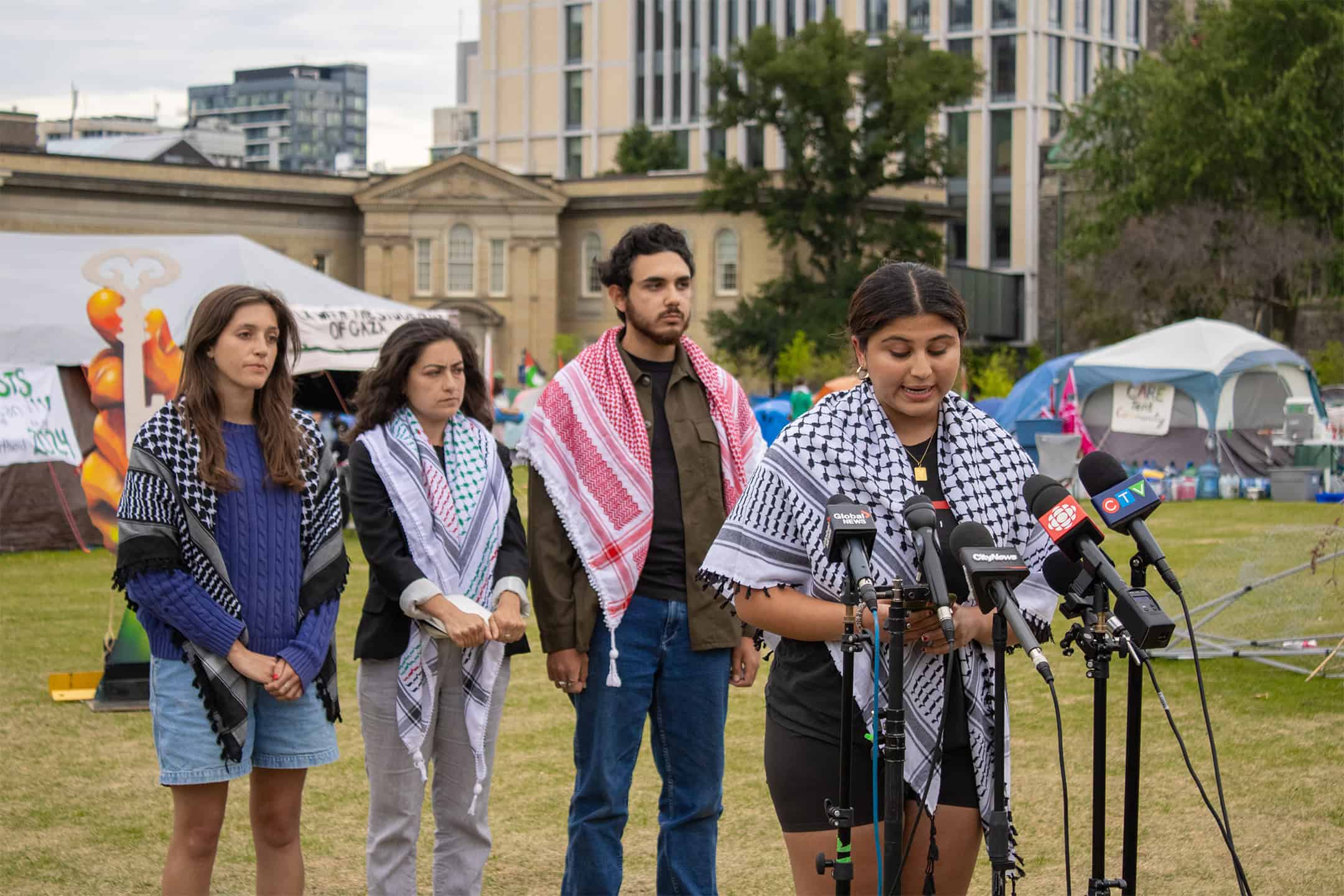On July 2, the Ontario Superior Court of Justice granted U of T’s injunction request to end the ongoing encampment at King’s College Circle.
Since May 2, UofT Occupy for Palestine (O4P) — the student group organizing the encampment — has demanded that the university disclose its financial holdings, divest from companies supplying Israel with weapons and services, and cut ties with Israeli academic institutions.
The student protesters occupying Front Campus have until July 3 by 6:00 pm to clear the encampment before Toronto Police Service (TPS) is authorized to arrest and remove them.
Final decision
Around 4:30 pm, Justice Markus Koehnen, the judge presiding over the university’s injunction case, released his reasoning behind the ruling.
He explained that U of T did not have sufficient proof to show that the encampment was violent or antisemitic.
“Apart from the initial appropriation of Front Campus and the continued exclusion of others from it, I find that the encampment is peaceful,” Koehnen wrote.
He added that he accepts the characterization of the student protesters as “young idealists fighting for what they in good faith perceive to be an important human rights issue.”
“I also accept that acts of intimidation and assault have been directed against Jewish passersby and encampment members at Front Campus,” he stated. “There is no evidence, however, to suggest that any of the named [protesters] or any other encampment members were in any way involved in those acts.”
Koehnen wrote that U of T provided sufficient proof in arguing that “the university has suffered irreparable harm because of the protesters’ continued appropriation of Front Campus and their exclusion of others from Front Campus.”
He noted that despite the cause, “protesters do not have the right to take property from its owner and put it into the hands ‘of an ad hoc, self-appointed, albeit well-meaning, group of individuals,’” citing Hamilton (City) v. Loucks — a case where the court granted an injunction to restrain protesters blocking construction vehicles from entering an environmentally sensitive valley.
The injunction ruling will allow the protesters to continue demonstrating throughout campus, but they will be prohibited from camping, erecting structures, blocking entrances to U of T property, and protesting on campus between 11:00 pm and 7:00 am.
“It is now time for the protesters to peacefully dismantle the encampment and focus their energies on building support within the group that will investigate divestment and within the broader University community to persuade both groups that divestment is a worthy goal,” Koehnen wrote.
He added that, “Persuasion will not be achieved through occupation but through reasoned discussion.”
U of T and TPS respond
In a statement to The Varsity, a U of T spokesperson wrote that Koehnen’s decision will “restore King’s College Circle for the use of all members of the U of T community.”
“We trust that those in the encampment will abide by the court order and vacate the encampment before the court-imposed deadline,” they stated. “Anyone who chooses to remain in the encampment after that deadline will be subject to consequences under university policy and the law.”
At 5:35 pm, U of T President Meric Gertler issued a statement, which stated that “Today’s court order returns Front Campus to the entire University community and prevents any one group from asserting control of a shared space at the University in order to promote a particular view and deprive others of the freedom to express opposing viewpoints.”
He mentioned that the university sent a letter to TPS requesting their assistance if the encampment is not cleared by the deadline.
At 8:00 pm, TPS released a statement on X which stated that they would enforce the court’s order. They mentioned that they would not disclose their “operational details” but stated that “police action is at our discretion.”
“We hope protestors will leave voluntarily to avoid police action,” the statement read.
Press conference
At 5:30 pm, O4P held a press conference inside the encampment. O4P spokesperson Mohammad Yassin, a recent economics graduate, criticized the university for their actions.
“From the moment we established our encampment, the university has shown its true colours,” said Yassin. “Instead of engaging with our demands, they’ve sought to silence us by any means necessary.”
O4P spokesperson Sara Rasikh, a masters student studying social justice education, explained that “this encampment is just one tactic, and we are prepared to employ as many as necessary to achieve our demands.”
“You can continue trying to get your injunctions,” she addressed the university. “You can call your police, but you cannot stop the people from pushing for justice.”
Sima Atri — a Community Justice Collective lawyer who represents some of the student protesters — also spoke about the court’s decision.
“We should not be surprised by the outcome, that this court has found that private property owners can control what is done on their land,” she said. “This is repeatedly what is done in injunction cases, when people stand up collectively and when they try to challenge the status quo.”
Erin Mackey — an O4P spokesperson and recent political science and environmental studies graduate — said that students will continue fighting for divestment “long after the encampment ends.”
She also mentioned that the O4P organizers will have discussions with the student protesters about their next steps.
In an interview with The Varsity, Yassin spoke about his experiences over the last two months since the encampment started.
“We’ve achieved a lot in these last two months,” he said. “We’ve brought a lot of the community together, and regardless of whatever happens… more and more students, faculty, and staff, and even the whole Toronto community is determined to continue fighting.”
When asked about the protesters’ next steps, Yassin explained that they’re “hoping to get some kind of community consensus” and that “it’s not going to be an easy decision either way.”
With files from Kaisa Kasekamp








No comments to display.